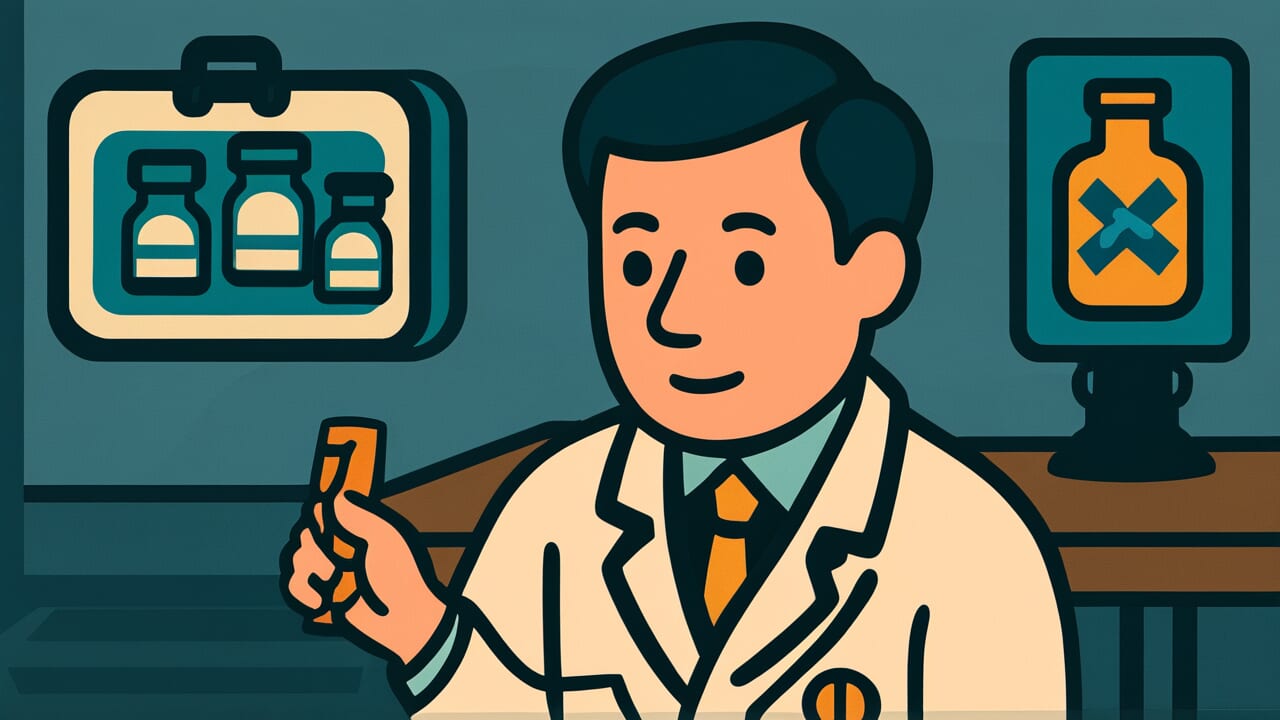How to Read “Just because there is medicine, one should not favor poison”
Kusuri areba tote doku wo konomu bekarazu
Meaning of “Just because there is medicine, one should not favor poison”
This proverb warns us not to deliberately choose bad or dangerous things just because good things or remedies exist. It teaches a very clear lesson: don’t do something foolish like taking poison just because medicine is available to treat it.
People use this saying to warn someone who wants to act recklessly just because safety measures or insurance exist. For example, it applies to driving dangerously because you have insurance, or living an unhealthy lifestyle because modern medicine is advanced.
This lesson still applies today. Having ways to reduce risk is completely different from deliberately taking risks. The proverb reminds us of simple but easily forgotten wisdom: prevent what can be prevented, and avoid dangers that can be avoided.
Origin and Etymology
The exact source of this proverb is unclear, but its structure offers interesting insights. The expression “areba tote” is a classical Japanese phrase meaning “just because something exists.” It shows concession or contrast.
The background of this saying likely relates to traditional Japanese medical thought. Japan has long been influenced by Chinese medicine, which brought the concept of “medicine and food share the same source.” People valued the wisdom of distinguishing between what helps and harms the body.
The use of the word “poison” is particularly noteworthy. Here, “poison” doesn’t just mean toxic substances. It represents a broader meaning of “things that cause harm” or “things to avoid.” Educational texts from the Edo period often warned against human weakness—the tendency to do bad things just because good remedies exist.
The prohibition word “bekarazu” is also important. This isn’t just advice—it’s a strong warning. The proverb sharply addresses a human psychological weakness: the temptation to think “I can take risks because I have insurance.” It formed as a lesson against this dangerous mindset.
Usage Examples
- Driving recklessly just because you have insurance is exactly what “Just because there is medicine, one should not favor poison” warns against
- Continuing to overeat and drink just because you get regular health checkups is truly “Just because there is medicine, one should not favor poison”
Universal Wisdom
This proverb reveals a dangerous structure of complacency hidden in human psychology. When we know safety devices or rescue measures exist, we strangely lower our psychological barriers to dangerous behavior.
Why did our ancestors leave us this lesson? Because humans are fundamentally creatures who easily fall into the illusion that “everything will be fine if there’s insurance.” Airbags exist, so speeding a little is okay. Savings exist, so wasting money is fine. Apologizing will earn forgiveness, so saying rude things doesn’t matter. This thought pattern is a human weakness that transcends time.
Thinking more deeply, this proverb teaches the value of “prevention.” Having treatment available and not getting sick in the first place hold completely different values. Just because medicine can cure you doesn’t mean getting sick is acceptable. We often forget this obvious truth.
Humans can make rational judgments, yet they’re also contradictory beings who become careless when reassurance exists and underestimate risks they should avoid. This proverb sees through human nature and teaches us the importance of always staying cautious.
When AI Hears This
Humans are abnormally sensitive to avoiding “losses.” According to prospect theory, the pain of losing 10,000 yen feels about 2.25 times stronger than the joy of gaining 10,000 yen. But interestingly, this “loss aversion bias” completely reverses when rescue measures exist.
For example, right after buying car insurance, people unconsciously drive more aggressively. The moment they know the “medicine” of insurance exists, the psychological weight of the “poison” of accidents becomes lighter. Research shows that after mandatory seatbelt laws, drivers’ speeding increased by an average of 8 percent. The medicine of safety devices actually induced the poison of dangerous behavior.
Even more interesting is how the human brain miscalculates probabilities. While “poison is poison even with medicine available,” the brain “discounts the poison by the amount of medicine available.” For example, with an action that has a 30 percent failure rate, people arbitrarily perceive it as “probably around 15 percent” when recovery measures exist.
This phenomenon appears everywhere in modern society. People make extreme statements on social media thinking they can just apologize if criticized. People overspend thinking their savings will cover it. The existence of medicine mathematically distorts our vigilance toward poison.
Lessons for Today
What this proverb teaches modern people is a clear distinction: “Being prepared and taking risks are separate issues.”
Modern society provides various safety nets. Health insurance, unemployment insurance, savings, backup systems. These are important mechanisms that protect our lives. But just because they exist doesn’t mean we should deliberately take risks.
For example, smartphone backup features don’t justify treating important data carelessly. Advanced medicine doesn’t justify neglecting your health. The same applies to relationships. You might be forgiven if you apologize, but not hurting people in the first place is far better.
This proverb reminds you of the “wisdom of prevention.” Preventing problems saves more time, effort, and peace of mind than dealing with them after they occur. Safety nets are for emergencies. Rather than using them as justification for reckless behavior, choose a lifestyle that avoids needing them. Isn’t that true wisdom?



Comments